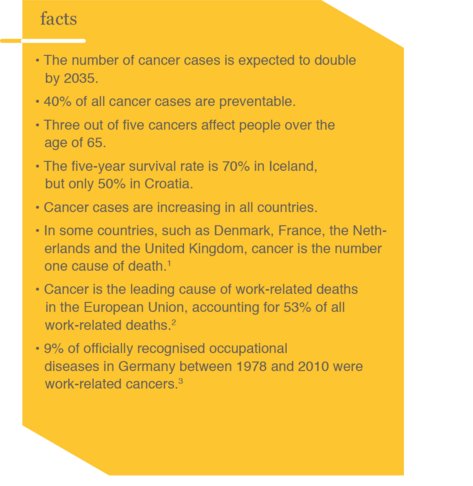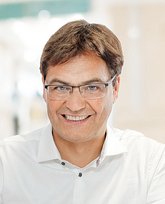 ©DragonImages - stock.adobe.com
©DragonImages - stock.adobe.com
The fight against cancer
Working together to fight cancer has a long history in Europe
ed* Nr. 01/2020 – Chapter 2
Europe can look back at 30 years of fighting cancer together. In the 1980s, the ‘Europe against Cancer’ initiative was launched with the aim of reducing the death rate by 15% below its predicted value for the year 2000. Unfortunately, this target was only achieved in Austria and Finland.
The European Code Against Cancer, first published in 1987, also goes back to this period of time. Its twelve recommendations on avoiding risk factors such as tobacco, UV light and alcohol as well as promoting a balanced diet, regular exercise and the use of preventive measures are as relevant today as they were back then.
More than ten years ago, the European Parliament (EP) also expressed its political commitment to the fight against cancer by passing a resolution. The establishment of an independent Special Committee on Cancer, which was agreed in January this year by the chairs of the various political groups in the ENVI committee, underlines Parliament’s continuing commitment. MEPs have stated that people must be shown that Europe provides added value when it comes to prevention, diagnosis and follow-up treatment.

Europe’s fight against cancer continues
Now, after many years, the European Commission wants to launch a new cancer plan. There are still many
challenges in the fight against cancer that need to be tackled together. The aim is to ensure that all people in Europe receive the same treatment. The Commission intends to propose concrete measures for all key stages of the disease by the end of the year. These will cover prevention, early detection and diagnosis, treatment and care, and improving the quality of life for those who survive cancer.
The launch on 4 February marked the start of a broad consultation phase to gather further feedback. This will give EU citizens and stakeholders the opportunity to have their say and make suggestions as early as possible on how best to tackle the issue at European level. The results of the consultation will feed into the design of the plan and help to define the main topics and the framework for future action. A detailed draft of the Europe’s Beating Cancer Plan, with short, medium and long-term objectives, will be presented at the end of the year.
Some details have already been announced. For example, the
new cancer plan will focus on the following:
- Cancer is to be fought holistically. In line with the Health in All Policies approach, the plan will cover schools, the world of work, the environment, agriculture and the food industry, science and research.
- In addition to tobacco and alcohol consumption, prevention will also focus on exercise, nutrition and vaccination. The development of a fair, healthy and environmentally friendly food system and protection against environmental influences ties in with the Green European Deal.
- Early diagnosis can save lives. Screening programs make a valuable contribution. The Cancer Plan is intended to provide technical support and encourage wider dissemination.
- Access to treatment and therapy is to be improved, palliative care expanded, and professional reintegration made easier.
- A European Health Data Space will promote the exchange of relevant information and research on prevention strategies and therapies.
But that’s not all. According to Health Commissioner Kyriakides, it is also time to change our way of looking at cancer. The focus should not be on the tumour, but rather on the individual person. It should also be about the unseen psychological and psychosocial consequences of the disease. Stigma and discrimination should be prevented, and the highest possible quality of life achieved.
Mission cancer
Brussels has also demonstrated a strong commitment to devoting more resources to research into the disease, its prevention and treatment. Cancer will be one of five new European missions and thus a European mandate for research and innovation. The trend towards a growing number of cancer cases is to be reversed. The missions are embedded in the Horizon Europe investment programme and will start in 2021. Horizon Europe not only defines the mission areas, but also what features they should have and how they should be monitored and managed.
A lot of personal commitment can be felt
Every issue needs committed champions. Ursula von der Leyen has put the issue at the top of the political priority list for her presidency. Health Commissioner Stella Kyriakides has personally fought the fight against cancer. Another passionate supporter of the cancer plan is MEP Peter Liese (EPP).
They are far from being alone – and they are right about one thing: joint action at European level in the fight against cancer can bring significant benefits, whether in research, in the use of data or in the exchange of best practice. The EU has repeatedly made a valuable contribution to the fight against cancer. Conversely, Germany has also made a valuable contribution to developments in beating cancer.

Dr. Peter LieseMember of the European Parliament since 1994 and currently Chairman of the European People’s Party (EPP) Group in the Committee on the Environment, Public Health and Food Safety (ENVI)
The Special Committee on Cancer elevates the fight against cancer to a top priority for the European Parliament. The Committee can articulate the expectations of the European Commission’s Beating Cancer Plan and then monitor its implementation. It is a strong signal to patients in Europe that all forces in the fight against cancer are now being brought together. The Special Committee is the ideal means of doing this. As different specialist areas are important for patients, expertise from all relevant European Parliament committees can be combined, and there is sufficient time for important discussions with experts and patients. The aim is to show the people concerned that there is a European added value in prevention, diagnosis, follow-up care and social rights.”


